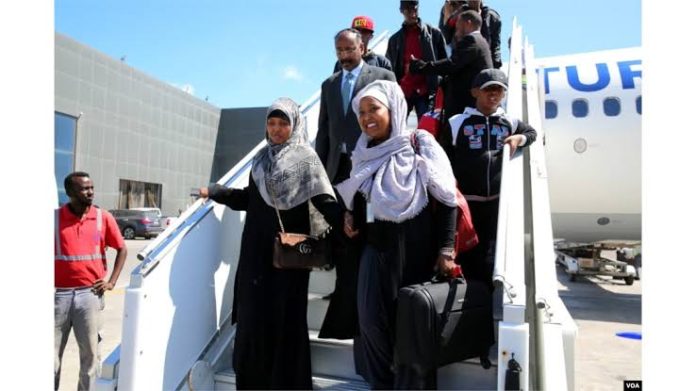Facebook Twitter (X) Instagram Somali Magazine - People's Magazine
The Libyan Anti-Illegal Migration Agency has announced the deportation of a group of migrants from Somalia who were residing in the country without legal documentation. The deportation took place on December 8, 2024, via Sabha International Airport, as part of Libya’s ongoing efforts to address illegal migration.
The migrants had been staying at the Brak Al-Shati shelter center, where they were held after being apprehended for violating Libyan immigration laws. According to the agency, all necessary deportation procedures were completed in compliance with Libyan legal frameworks.
Deportation Process and Legal Considerations
The deportation process involved close coordination between Libyan authorities and Somali representatives. Migrants were issued travel documents to facilitate their return to Somalia. Authorities emphasized that the move was part of a broader strategy to ensure adherence to Libyan immigration laws, which prohibit unauthorized entry and residence.
The Anti-Illegal Migration Agency stated through its communication office:
“The deportation of these individuals aligns with Libyan laws aimed at regulating migration and protecting the country’s sovereignty. Efforts were made to ensure the deportation process respected the legal rights of all individuals involved.”
Challenges Faced by Migrants
The deported individuals are part of a larger group of migrants in Libya seeking better opportunities or attempting to transit through the country to Europe. Many of these migrants face precarious living conditions, including overcrowded shelters, limited access to resources, and legal uncertainties.
Human rights organizations have consistently highlighted the challenges faced by migrants in Libya, calling for improved conditions and more humane treatment. The deportation of migrants raises concerns about their reintegration into their home countries, where economic and political instability often persist.
Libya’s Migration Policy Under Scrutiny
Libya has long been a transit point for migrants traveling from Africa to Europe. Its geographical location and porous borders have made it a hub for irregular migration, drawing scrutiny from international bodies and neighboring countries.
The Anti-Illegal Migration Agency has ramped up efforts to control the influx of migrants, with measures including detentions, deportations, and increased border patrols. However, these actions have faced criticism from human rights groups, which argue that more sustainable solutions are needed to address the root causes of migration.
Somalia’s Response and Migrants’ Future
The Somali government has acknowledged the return of its citizens and expressed commitment to assisting them with reintegration. Officials highlighted the importance of addressing the factors that drive migration, such as unemployment, insecurity, and limited opportunities at home.
Somalia’s Ministry of Foreign Affairs reiterated the need for collaborative efforts between source, transit, and destination countries to create pathways for safe and legal migration.
Calls for International Action
International organizations, including the International Organization for Migration (IOM) and the United Nations High Commissioner for Refugees (UNHCR), have called for a comprehensive approach to migration management. This includes strengthening legal migration channels, providing humanitarian assistance to migrants, and addressing the socio-economic challenges that force individuals to leave their home countries.
Looking Forward
The deportation of Somali migrants from Libya underscores the complexities of managing migration in a region marked by economic disparities, political instability, and security challenges. It also highlights the urgent need for global cooperation to address the root causes of migration and protect the rights of vulnerable populations.

